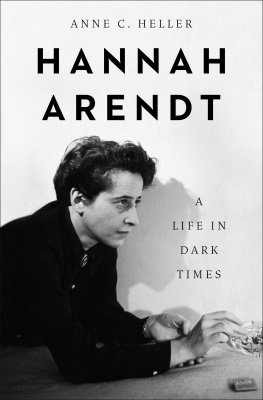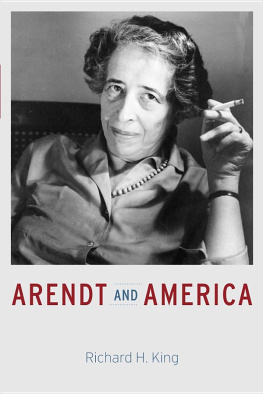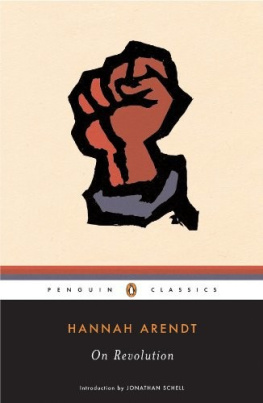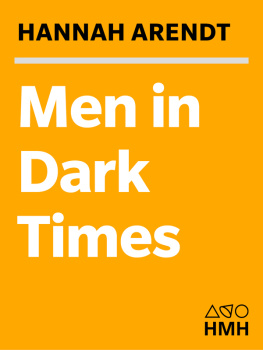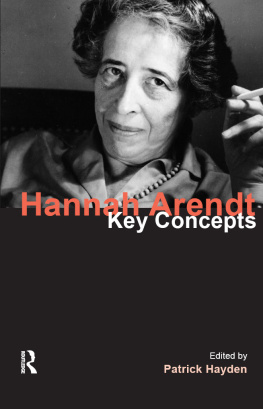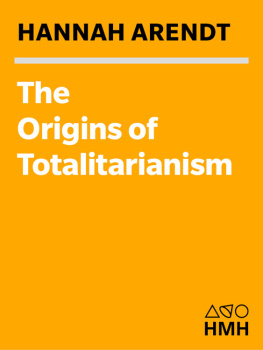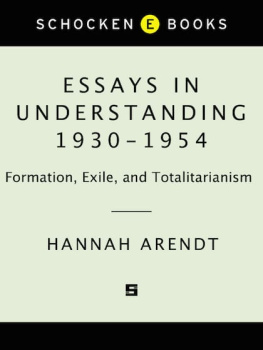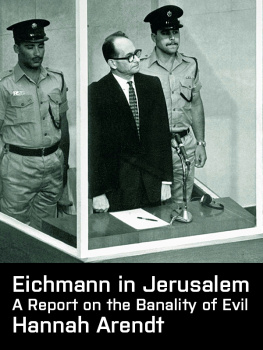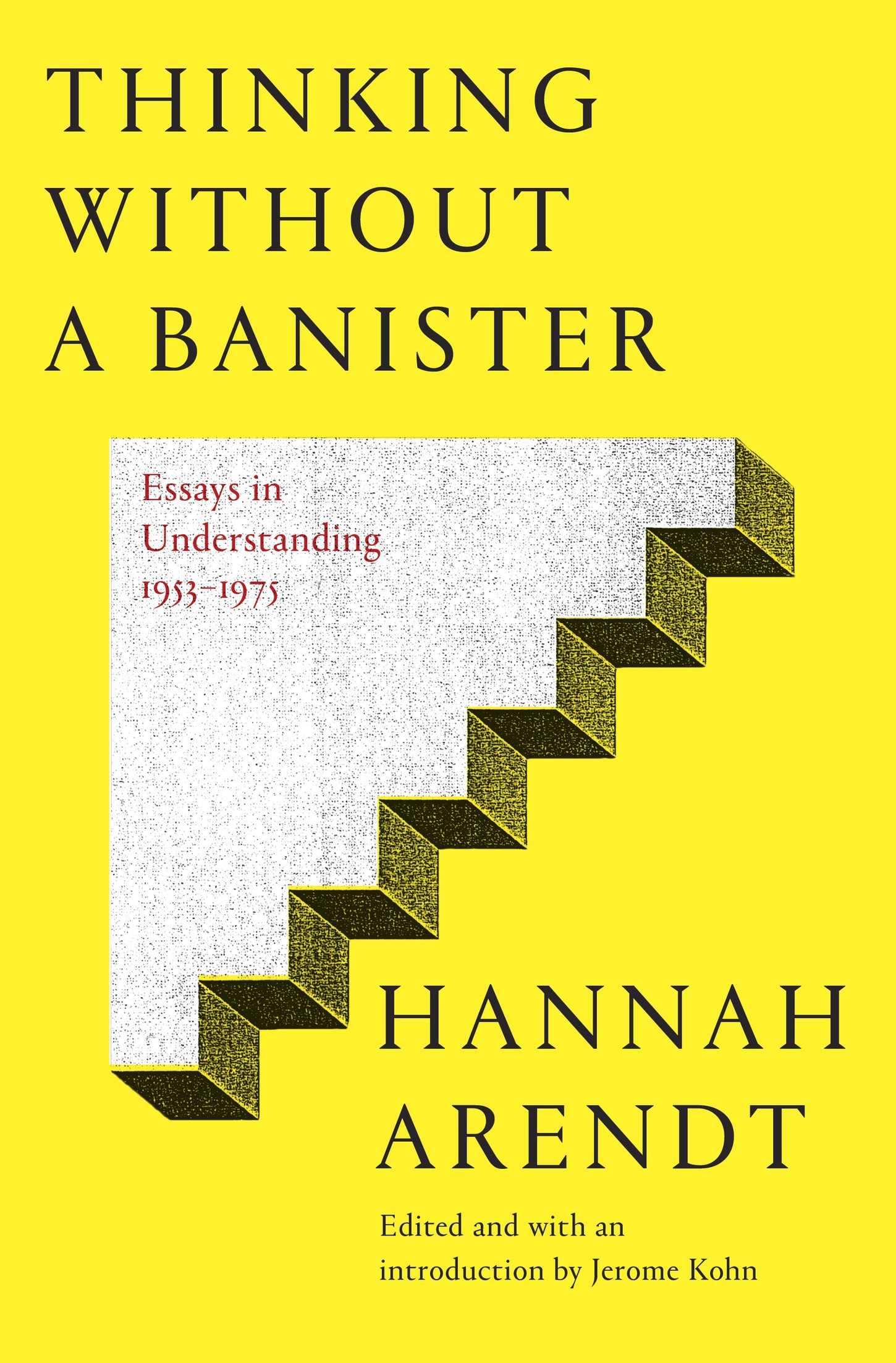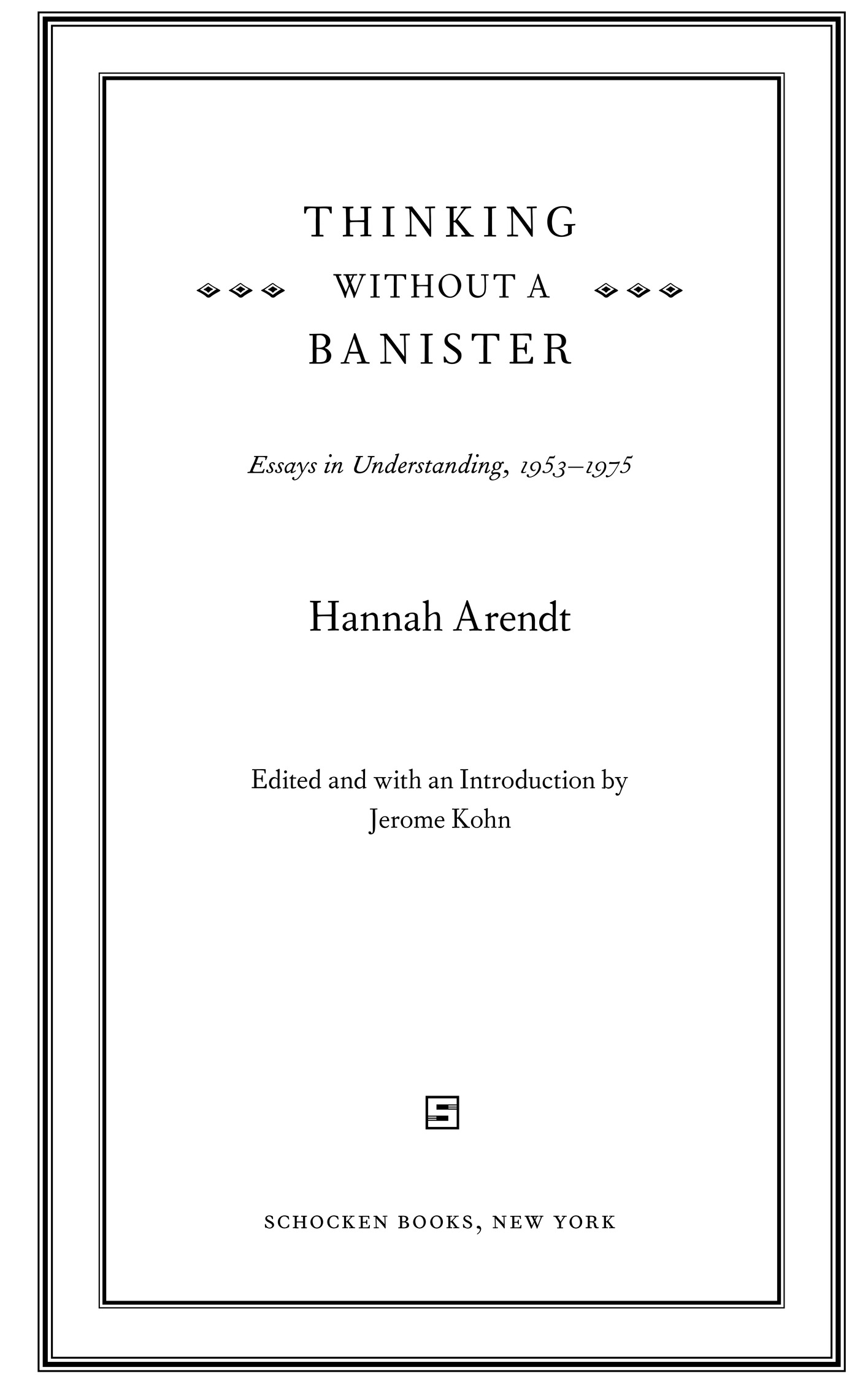ALSO BY HANNAH ARENDT
Nonfiction
Between Past and Future: Eight Exercises in Political Thought
Crises of the Republic
Eichmann in Jerusalem: A Report on the Banality of Evil
Essays in Understanding, 1930 1954
The Human Condition
The Jew as Pariah: Jewish Identity and Politics in the Modern Age
The Jewish Writings
Lectures on Kants Political Philosophy
The Life of the Mind, Vol. I Thinking, Vol. II Willing
Love and Saint Augustine
Men in Dark Times
On Revolution
On Violence
The Origins of Totalitarianism
The Promise of Politics
Rahel Varnhagen: The Life of a Jewish Woman
Responsibility and Judgment
Correspondence
Between Friends: The Correspondence of Hannah Arendt and Mary McCarthy, 1949 1975
Correspondence, 1926 1969 (with Karl Jaspers)
Letters, 1925 1975 ( with Martin Heidegger)
Within Four Walls: The Correspondence Between Hannah Arendt and Heinrich Blcher, 1936 1968
Copyright 2018 by The Literary Trust of Hannah Arendt and Jerome Kohn
All rights reserved. Published in the United States by Schocken Books, a division of Penguin Random House LLC, New York, and distributed in Canada by Random House of Canada, a division of Penguin Random House Canada Limited, Toronto.
Schocken Books and colophon are registered trademarks of Random House LLC.
Excerpts from the poems of W. H. Auden appear courtesy of Edward Mendelson, Executor of the Estate of W. H. Auden; Random House, a division of Penguin Random House LLC; and Curtis Brown, Ltd.
As If Speaking to a Brick Wall: A Conversation with Joachim Fest originally published, in slightly different form, in Germany as Eichmann war von emprender Dummheit: Gesprche und Briefe by Piper Verlag GmbH, Munich, in 2011. Joachim Fests questions copyright 2011 by Piper Verlag GmbH. This translation first published as Eichmann Was Outrageously Stupid by Melville House Publishing, New York, in 2013. Translation of Hannah Arendts responses copyright 2013 by Hannah Arendt Bluecher Literary Trust. Translation of Joachim Fests questions copyright 2013 by Andrew Brown.
Interview with Roger Errera originally aired in France as Un certain regard by Office National de Radiodiffusion Tlvision Franaise (ORTF) in 1974, and subsequently published in Hannah Arendt Newsletter, #2 (December 1999). This translation first published as The Last Interview by Melville House Publishing, New York, in 2013. Copyright 2013 by The Literary Trust of Hannah Arendt Bluecher. Translation of Roger Erreras questions copyright 2013 by Andrew Brown.
Library of Congress Cataloging-in-Publication Data
Arendt, Hannah, 19061975.
[Works. Selections]
Thinking without a banister : essays in understanding, 19531975 / Hannah Arendt ; edited and with an introduction by Jerome Kohn.
Includes index.
ISBN 978-0-8052-4215-7 (hardcover : alk. paper). ISBN 978-1-101-87030-3 (ebook).
1. Philosophy, Modern20th century. I. Kohn, Jerome. II. Title.
B 945. A 694 2015 191dc23 2014046457
www.schocken.com
Cover design by Linda Huang
Ebook ISBN9781101870303
v5.2
ep
Contents
Theres this other thing, which Draenos brought upgroundless thinking. I have a metaphor which is not quite that cruel, and which I have never published but kept for myself. I call it thinking without a banisterin German, Denken ohne Gelnder. That is, as you go up and down the stairs you can always hold on to the banister so that you dont fall down, but we have lost this banister. That is the way I tell it to myself. And this is indeed what I try to do.
Hannah Arendt
INTRODUCTION
Jerome Kohn
The Republic of the United States of America has been in a state of decline for more than fifty years, that is, if the decline is dated from the debacle of the invasion of Cuba at the Bay of Pigs in 1961. More than a century before that, John Quincy Adams already despaired of what he called the noble experiment, chiefly due to the mordant division of public opinion over the issue of human slavery.
Today, the apathy of public opinion is denounced by politicians of all parties and pundits of all political stripes, for the sake of their own power. But for the people, what does an addiction to polls, however cockeyed their results, signify other than an obsession with public opinion? It will come as no surprise to those familiar with Hannah Arendts way of thinking that she believed polls, like senseless calls for donations, signify either having lost or been swindled out of ones own opinion. Speaking with a group of students in Chicago in 1963, Arendt said that every one of us is forced to make up his mind and then exchange his opinion with others. You may remember, she said, the great mistrust the founders had in public opinion, which stands opposed to public spirit. Where public spirit is lacking, public opinion comes in its stead. To Arendt this is a perversion, and a danger to all republics, perhaps especially those that consider themselves democracies. For (now quoting Madison, Federalist, 50) when men exert their reason cooly and freely on a variety of distinct questions, they inevitably fall into different opinions.When they are governed by a common passion, their opinions, if they are so to be called, will be the same.
Thomas Jefferson was a party of one, though not in the sense of The Loners Manifesto, which would transmogrify loners, political and otherwise, into a group identity! In a letter to Francis Hopkinson written from Paris in March of 1789, Jefferson wrote: I am not a federalist, because I never submitted the whole system of my opinions to the creed of any party of men whatever in religion, in philosophy, in politics, or in any thing else where I was capable of thinking for myself. Such an addiction is the last degradation of a free and moral agent. If I could not go to heaven but with a party, I would not go there at all. Therefore I protest to you I am not of the party of federalists. But I am much farther from that of the Antifederalists.
If the American Republic has failed, who bears the responsibility? That question can be construed economically orin various formspsychologically, which, to Arendt, would bring forth social rather than political answers. To respond politically would require an observer standing at a distance from the certain but ambiguous sociability of men and women. A political response would be to a somewhat different and more precise question: How have citizens of the United States dissipated the power of their Republic? Her last public address, delivered in the last year of her life, 1975, in celebration of the approaching two hundredth anniversary of the birth of the American Republic, contains indications of what she might say today. There she emphasized the erosion of power in this country, the nadir of self-confidence when victory over one of the tiniest and most helpless countries could cheer the inhabitants of what only a few decades ago really was the mightiest power on earth (referring to the United States in the mid- to late 1940s, after the Allied victory in World War II). She next mentions something that, by 1975, seemed to her the mini-crisis triggered by Joe McCarthy in the 1950s, which heralded the destruction of a reliable and devoted civil serviceprobably the most important achievement of the long Roosevelt administration. From that point on there had been a cataclysm of events, tumbling over one another, and, in words frequently quoted, cascading like a Niagara Falls of history whose sweeping force leaves everybody, spectators who try to reflect on it and actors who try to slow it down, equally numbed and paralyzed. Now, more than forty years after Arendt delivered that speech, how often do we still hear this country hailed as the worlds greatest power, or sole superpower, with even less justification than in 1975? Even more confusing, today this swagger is accompanied by the politically empty economic caveat that somehow America must return to her former wealth and greatness.


